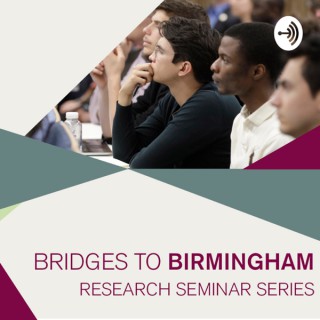Bridges to Birmingham
Follow Bridges to BirminghamThe Bridges to Birmingham Seminar Series showcases world-leading research from the University of Birmingham and features academic faculty and Partners commenting on current issues, their research and important world events.
University of Birmingham Dubai
- Sep 24, 2020 LATEST EPISODE
- monthly NEW EPISODES
- 48m AVG DURATION
- 10 EPISODES
Latest episodes from Bridges to Birmingham

Wednesday 23rd September 2020 - as part of our Welcome 2020 activities, our Student Leaders along with our Student Wellbeing Officer, Richard, take questions from new students on clubs, events, bimodal studying and student wellbeing provision.

COVID-19 pandemic impact and challenges for recovery in the Construction Industry
Professor Ian Jefferson, Professor of Geotechnical Engineering, Interim Deputy Head of College, Engineering and Physical Sciences, at the university’s School of Engineering and Ian Maund from Quantum Global Solutions, who is also the Chairman of the Chartered Institute of Building, MENA region and the Dubai hub discuss the current impact of COVID-19 and the challenges faced in the construction industry with insights into the longer term impact of COVID-19.

Issues being faced during the COVID-19 pandemic and the impact on plans for Smart Cities
Featuring Professor Chris Rogers, Geotechnical Engineering, from the University of Birmingham and Dr Sabih Getea Khisaf, Head of Engineering Middle East and North Africa at Hyperlook Transportation Technologies Inc

Peter Braithwaite, Director of Engineering Sustainability at the University of Birmingham and Karl W Feilder, CEO, Founder & Chairman of Neutral Fuels discuss sustainability during COVID-19

Issues being faced during the COVID-19 pandemic and the impact on the Legal Sector
Stuart Walker, partner at Afridi & Angell Dubai and David Holloway, Barrister and Senior Lecturer in Law at the University of Birmingham, discuss the impact on the legal sector during, and post COVID-19.

How can schools best prepare for the new academic year in the light of COVID-19?
Professor Colin Diamond CBE, Director of the Education Leadership Academy, University of Birmingham and Ambika Gulati, Principal at The Millennium School Dubai, discuss how schools can prepare for the new academic year with the current challenges facing schools, teachers and parents.

COVID-19 Pandemic and precarious Economies: Risk and Value in existing business models and the change required for recovery
Professor John Bryson from the University of Birmingham Dubai and Sarah Bartlett, Director at KEKST CNC Dubai discuss the effectiveness of existing business models during the COVID-19 pandemic and the changes that businesses may need to consider during the post COVID-19 recovery period.

The Dubai Disabilities Strategy articulates a clear and unequivocal commitment to creating a fully cohesive and inclusive strategy and places inclusive education at the heart of an effective education system. There are, however, challenges associated with becoming inclusive that arise from conceptual, structural and systemic factors and which have slowed down countries’ progress towards inclusion. In this lecture, Prof Allan reflects on some of the global challenges and report on four instances of where these challenges have been overcome, leading to successful inclusion. These ‘successes’ have been achieved by a school (in Sweden), by parents (in Kazakhstan) and by students (in the United Kingdom) and reinforce Dr Abdulla Al Karam’s contention that it is teachers, parents, leaders and other professionals who hold the power to create change. Prof Allan ends with some reflections on the prospects and possibilities for inclusion in the UAE.

Agency theory emphasizes the importance of an independent board chair in balancing CEO power and controlling management’s self‐interest (Krause, Semadeni and Cannella, 2014; Krause, Semadeni and Withers, 2016; Withers and Fitza, 2017). Such has been known to be the key reason for separating the roles of the CEO and the board chair (Finkelstein and D’Aveni, 1994; Lorsch and MacIver, 1989). The working relationship between the CEO and the board chair is, therefore, important and could determine the success or failure of the firm. However, despite the fact that the leadership roles of the CEO and the board chair form one of the most important dyadic relationships in large firms, anchored on goal interdependence, we know very little about it especially on how this relationship develops and indeed on its consequences. For example, under what circumstances is this relationship likely to be stronger or weaker? What is the impact of this relationship on firm performance? Drawing on social interdependence theory, this lecture explores these questions, contributing to the theory and literature of corporate governance, in general and board dynamics, in particular.

Dubai Provost Distinguished Lecture Series - The Power of Universities to Power the World with Lord Bilimoria
Lord Bilimoria’s lecture will examine the role of universities, their ability to impact on the world around us, to be a driving force for collaboration, influencing policy and contribute to tackling global issues.








